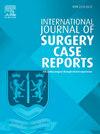Transverse mesocolic hernia successfully treated by emergent laparoscopic reduction in a geriatric patient: A case report
IF 0.7
Q4 SURGERY
引用次数: 0
Abstract
Introduction and importance
Transverse mesocolic hernia is an extremely rare type of internal hernia, with only a limited number of cases reported to date. In this case report, we present a geriatric patient with a transverse mesocolic hernia who was successfully treated with emergent laparoscopic surgery.
Case presentation
An 89-year-old male patient presented with abdominal pain and distension that had begun the previous day. He had multiple comorbidities, such as diabetes mellitus, hypertension, and prostate cancer. Additionally, he had been prescribed an antiplatelet agent for a history of cerebral infarction. He had no previous abdominal surgery except for an appendectomy at a young age. Computed tomography revealed a closed-loop obstruction of the ileum on the right side of the superior mesenteric vein. Emergent laparoscopy revealed incarceration of the small intestine through a defect in the transverse mesocolon, which was successfully reduced. The postoperative course was uneventful, and the patient was discharged without any decline in activities of daily living.
Clinical discussion
First, this was an extremely rare case of internal hernia that required emergent surgical intervention. Second, minimally invasive surgery was successfully performed, contributing to a rapid postoperative recovery, despite the patient being geriatric and having multiple surgical risk factors.
Conclusion
We managed a case of transverse mesocolic hernia. This case report provides valuable insights into the clinical course of the disease and the effectiveness of emergent laparoscopic reduction in geriatric patients.
经急诊腹腔镜复位术成功治疗横向肠系膜疝1例
简介及重要性横切性肠系膜疝是一种极为罕见的内疝类型,迄今为止报道的病例数量有限。在这个病例报告中,我们提出了一个老年患者的横向肠系膜疝谁是成功的治疗紧急腹腔镜手术。病例介绍:89岁男性患者,前日开始腹痛和腹胀。他有多种合并症,如糖尿病、高血压和前列腺癌。此外,他还因有脑梗死史而被开了抗血小板药。除了年轻时做过阑尾切除手术外,他之前没有做过腹部手术。计算机断层扫描显示肠系膜上静脉右侧的回肠梗阻。紧急腹腔镜检查显示小肠嵌顿通过一个缺陷的横向结系膜,这是成功地减少。术后过程平淡无奇,患者出院时没有任何日常生活活动下降。首先,这是一个极其罕见的需要紧急手术干预的内部疝病例。其次,微创手术成功实施,有助于术后快速恢复,尽管患者是老年人,有多种手术危险因素。结论我们治疗了1例横切性肠系膜疝。本病例报告提供了宝贵的见解,对疾病的临床过程和急诊腹腔镜减少在老年患者的有效性。
本文章由计算机程序翻译,如有差异,请以英文原文为准。
求助全文
约1分钟内获得全文
求助全文
来源期刊
CiteScore
1.10
自引率
0.00%
发文量
1116
审稿时长
46 days

 求助内容:
求助内容: 应助结果提醒方式:
应助结果提醒方式:


